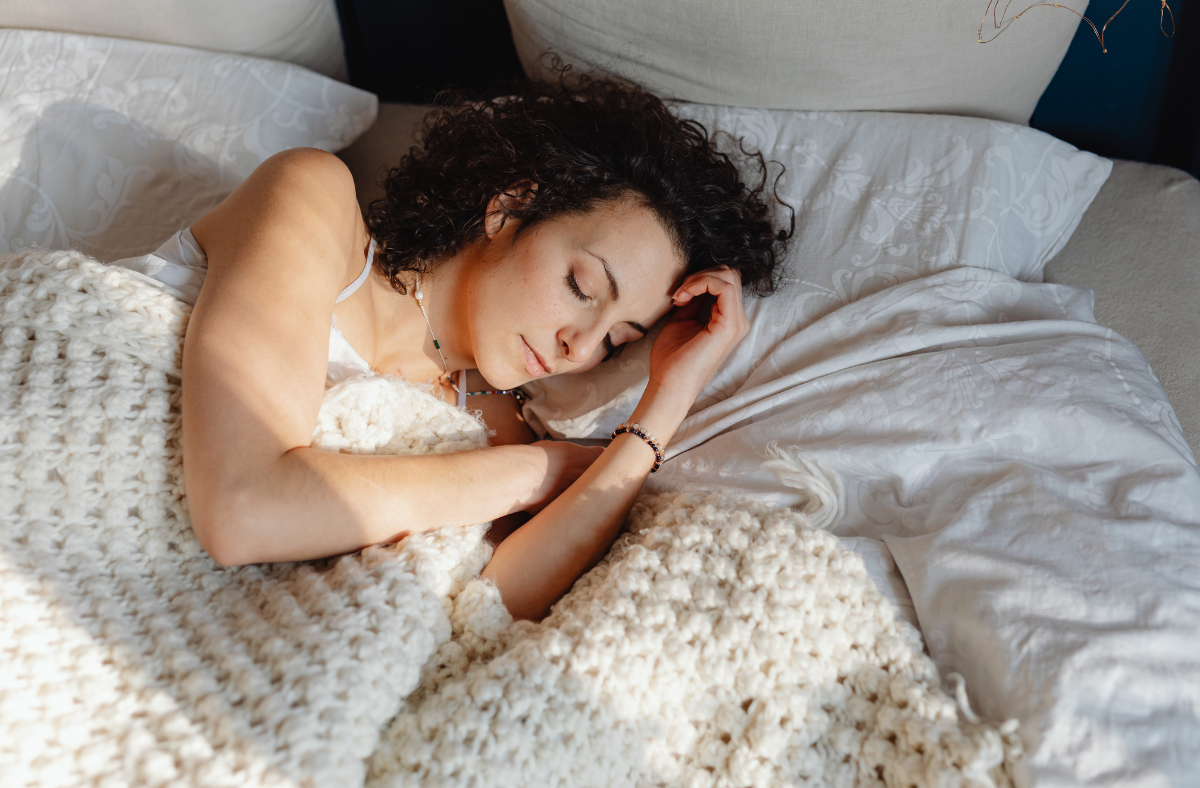Cathy Foreman MS, RD
For households with a new baby, if there is an opportunity for a parent to lie down and rest it’s almost sacred time. “Sleep when the baby sleeps” is common advice that has real value, but in reality is often not followed. There’s always so much to do and something to get done. It’s hard to slow down. For new moms in particular, we know sleep is vital for mental health and overall wellness.
When we look at the topic of sleep from a modern-day perspective, one important question is: How can smartphones support, rather than distract from, the rest a mom needs?
The rest of this article looks at some app ideas for developing infant sleep routines and supporting rest for parents. Also included are some suggestions to decrease negative impact of smartphones on sleep.
“Sleep, Baby, Sleep”

If a baby sleeps, you can sleep. Developing a baby’s sleep routine is a big part of early parenting that can be unknown territory at first. Learning about various parenting methods, finding what matches your developing parenting style, and matching it with your baby’s needs applies to sleeping too. Here are a couple apps that may be helpful when it comes to infants and sleeping. (But do take note: if tracking, logging, and monitoring becomes an anxiety-producing process in itself, then it’s perhaps time to rethink the overall value of that system. Especially if it overshadows your own growth and confidence as a parent.)
Smart Sleep Coach by Pampers is an interesting app designed to help create a customized sleep plan for your baby. It includes a sleep tracker that not only organizes data so you can follow sleep patterns, but builds on those patterns and biological rhythms to suggest optimal times to put your baby down to sleep. Other features include education content on infant sleep, information on infant sleeping cues, guided meditations, and sleep coaching.
Huckleberry: Baby and Child is another sleep-guidance and tracking app for babies. It also includes tracking features for feeding, diaper changes, nursing/pumping breastmilk, and more. A popular feature of this app is the “Sweet Spot.” By using your baby’s sleep-tracking information, it predicts ideal nap and sleeping times individualized to your baby’s patterns, with the goal of helping families establish useful bedtime routines.
“Sleep When Baby Sleeps”
How about apps for moms and their own sleep? Can their smartphones be helpful for falling asleep and to stay asleep? This question has one of those “yes, but…” answers. Let’s talk about the “yes” part of the answer first.

There are many great apps that can support rest and sleep. It can really depend on someone’s personal preferences and their habits. These habits, however, may be not-so-good habits when it comes to sleep hygiene. Consider apps that are designed to create a relaxing sound environment, such as white noise apps, music playlists, or audiobooks. But be selective on your content: it should be relaxing to you, and not too intense or engaging.
Some content channels will read in a sleep-friendly voice. Other apps are meditation-centered and may be helpful for reducing anxiety or for slowing down your mind and body for sleep.
Below are a few apps suggestions:
Endel is one of many white-noise apps readily available for smartphones. Using white noise in a room is a common way to mask unwanted, disruptive sounds.
White Noise: Sleep Sounds is actually a white-noise app for babies. It generates ambient sounds such as vacuuming, blow dryers, and waterfalls. There is a built-in timer system with a “fade out” function.
Spotify is just one of many music-streaming apps. Some apps include playlists for babies. Many also have audiobooks and podcasts included. Look for pre-made “sleep and relaxation” playlists; or, better yet, create your own custom play.
Calm: There is no shortage of meditation apps available for smartphones. They are another popular genre in the app world. Calm has many sleep and relaxation features, such as guided meditations, sleep stories, soft music, soundscapes, and sleep hygiene courses.
Yoga | Down Dog: Yoga apps are a great way to practice in a home environment. Down Dog offers many choices of yoga styles and background music, including gentle nighttime resting poses and routines.
“Sleep Time, Not Screen Time”

Valuable as apps can be, smartphones themselves can be a reason someone has difficulties falling asleep—or why they have poor-quality sleep. The common habit of screens at bedtime can interrupt circadian rhythm, suppress melatonin secretion, decrease REM sleep, and wind up rather than slow down your brain when your head hits the pillow. So, what can we do to give ourselves more control over our phones when we have an opportunity to lie down and sleep?
Here are some ideas:
- Turn on “Do Not Disturb” mode to silence notifications.
- Change your display to black and white. The use of color keeps the brain engaged.
- Use “Night Mode” to shift the “color temperature” of your screen from blue light to an orange color scheme, reducing intensity.
- If you listen to a music playlist or stories as you fall asleep, turn off auto play and continuous play, or have an end timer on. This will ensure the sound doesn’t continue after you have fallen asleep.
- Turn on the “Reduce Motion” setting. This impacts the visual experience on a phone with simpler movements on the screen. It creates less distraction, reduces eyestrain, and is visually more comfortable.
- Start practicing digital minimalism. It may be an obvious suggestion, but perhaps it will be transformative. It may involve a simple change, such as just placing your phone out of arm’s reach from your bed. Or even going “old school” by reading a paper book before bedtime to keep you from browsing social media and doom scrolling.
It can be a challenge for moms to prioritize their own sleep. Technology can be used in a careful way to support sleep by creating a more soothing environment, helping with guided relaxation, and even with creating infant sleep routines. But it’s also important to consider taking steps to ensure your smartphone is less disruptive to healthy sleep and mental health. Getting quality rest helps set a healthier foundation for you to take care of … you. And that’s good for your family.

The Maternal Mental Health Hotline number is available for you to call or text if you need someone to listen, connect you to a local support group, or refer you to a health care professional. That number is: 1-833-TLC-MAMA (1-833-852-6262).
This blog is part of our 4-part series on maternal health, technology, and access. Check out the full series:
• Part 1: You Are Not Alone: National Maternal Mental Health Hotline Number
• Part 2: TLC for Moms: Making Sleep A Priority by Recruiting Help
• Part 3: Is Sleep Time Tech Time?
• Part 4: You’re Not What You Eat

